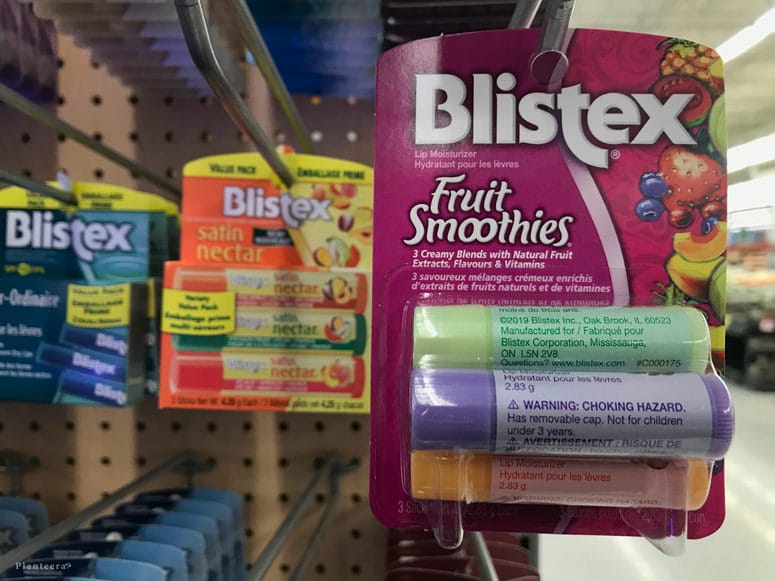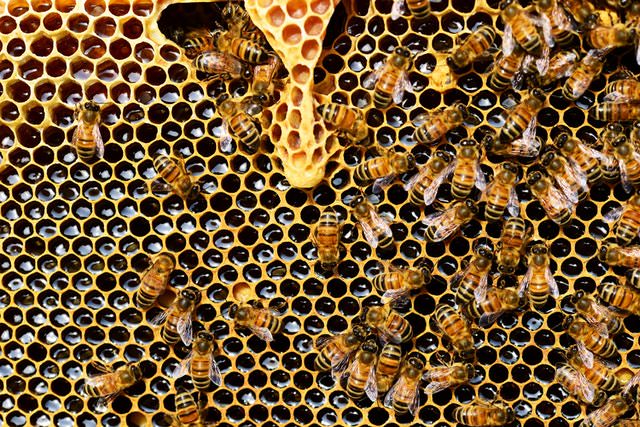Table of Contents
Last updated on June 13th, 2021 at 09:11 pm
Blistex is not vegan because its lip balms contain beeswax or lanolin.
Chapped, dry lips have been a problem for generations and were only dealt with in the 1800s when lip balm was first invented.
Today, you can find a variety of lip balms to treat a host of different issues. For example, certain lip balms are designed to thoroughly moisturize and revive chapped lips, while others are made to make your lips look fuller and perkier.
And Blistex is one company that offers a whole range of lip-care products to choose from.
What is Blistex?
Blistex is an American company that develops, produces, and markets a range of personal care products.
When they were established back in 1947, their primary focus was on lip-care products, and even today, Blistex is synonymous with lip-balm, with many consumers going so far as to use the word ‘Blistex’ while referring to any kind of lip balm.

Is Blistex Vegan?
While Blistex has claimed that they are working on products free from animal ingredients, right now, none of the Blistex lip balms are vegan or cruelty-free. The two main non-vegan ingredients in Blistex are beeswax and lanolin, and both are obtained through cruel, exploitative methods.
Beeswax
Beeswax is obtained by melting the honeycomb and straining the wax to remove the impurities. The residue is then pressed to extract any remaining wax, which is then poured into molds to solidify.
Sounds harmless, right?

But consider how the honeycomb is obtained in the first place. Workers breed bees in enclosed spaces so they can colonize and build honeycombs, which are then used to extract beeswax.
Honey is a bee’s primary source of nutrition, and without honey, a bee can’t survive. During extraction, workers replace the honey with a sweet, sugary syrup that mimics honey to keep the bees satiated.
However, honey contains vital nutrients for a bee’s survival. Without it, many of the bees succumb to infection and disease and die due to lack of proper nutrition.
Also, consider that a honeycomb isn’t just the bee’s home but a palace in which the queen bee is protected. When workers try to extract honey from this fortress, the bees will try and defend it with their lives. As a result, hundreds of these bees die trying to protect their homes.
So as you can see, the practice of obtaining beeswax is both exploitative and cruel, and any product using this ingredient cannot be considered vegan.
Lanolin
Lanolin is a kind of wax secreted by wool-bearing animals. It is obtained from sheep that have been raised specifically for their wool.
On the surface, this may not seem like a cruel practice; after all, wool can be fleeced off a sheep, and it’s separate from the rest of the sheep’s body. So it must be harmless, right? Well, not exactly.
When it comes to the industrial production of any animal-derived product, cruelty is the norm rather than the exception.
Consider that wool farms house hundreds of thousands of sheep in a far too cramped space for such large numbers. These sheep are reared primarily for their wool, and little care (if any) is given to their health, well-being, and emotional needs. But cramped conditions and cold indifference is just the beginning.
Shearing the wool isn’t such a cut-and-dry process either, where workers simply ‘snip off’ the wool and send the sheep on its way. Wool-farm workers are expected to meet individual quotas when it comes to shearing and couldn’t care less about how the sheep are treated in the process.
Most of the workers are rough and rushing about to get the job done. As a result, many of the sheep end up getting cut or bruised by the shears where workers were careless. Some (the liveliest and most reluctant sheep) even sustain severe and sometimes fatal injuries from shearing.
The sheep are also thrown into a panic in the process. They naturally try and run or get away from the workers. In response, many workers resort to brute force to control the sheep, and some even beat them into submission so the shearing can be carried out with ease.
As such, the industry is anything but cruelty-free, and since lanolin, obtained from wool, is a primary ingredient in most Blistex products, this makes Blistex products non-vegan as well.
Animal Testing
Aside from the fact that they use animal ingredients in their products, Blistex is also quite uncertain and shaky about animal testing policies.
Blistex has claimed that they only test their products on human volunteers and through in-vitro testing, both of which are humane forms of testing. They also claim that they are against animal testing and are in the process of finding new, safer methods of testing products.
However, they have also stated that their products are only tested on animals when they are being sold in countries where animal testing is mandatory by the government.
And recently, Blistex has opened a market in China, a country in which animal testing is carried out on every product before it is approved by the government and sold to the public.
So while Blistex does not directly test its products on animals, they seem to have no qualms about selling their goods in countries where animal testing is prevalent.
This clearly highlights their stance on animal testing, and it seems, from this information, that they are willing to put profits above the welfare of animals.
Vegan and Cruelty-Free Lip Balms
Luckily, the personal-care market is flooded with lip balms that are entirely vegan and free from animal exploitation. And while these companies may not offer the range of products that Blistex does, you can safely purchase their lip balms knowing that an innocent being isn’t being harmed in the process.
1. Eco Lips
Eco Lips is a lip balm with a lower price range than most other vegan lip balms on the market. It’s easily applicable and lasts a long time, so you won’t have to worry about reapplying the balm every hour.
It’s made with a combination of essential oils designed to soothe the lips and aid in circulation. It also contains cocoa butter and coconut oil, both of which help to soften the lips, lending them a warm glow and a more perky appearance.
The only drawback is perhaps the fact that all Eco Lips products come without SPF protection, so you’ll need a separate balm or moisturizer to supplement this one.
2. Pure + Simple
The texture on this lip balm is just perfect — not too thick or oily, but in that sweet spot between being smooth and giving your lips enough support.
The best part is that thanks to essential oil mixes used in this product, it smells and tastes great. The lip balms from Pure + Simple also use avocado oil, which provides the lips with omega-3 fatty acids, necessary for improved circulation and skin health.
Their formula also contains inorganic vitamin E, which provides the lips with antioxidants, destroying free radicals and minimizing any damage done to the lips.
3. Pacifica
This sheer-colored lip balm is marketed mostly towards women, but of course, anyone can enjoy the benefits that come with it.
Pacifica a range of exciting and exotic flavors, like Blood Orange, Sugared Fig, and Vanilla Hibiscus, each with its unique taste and smell.
Their ingredient list also contains soybean wax, which is ethical, biodegradable, and harmless to the environment.
4. Hurraw
Hurraw happens to be one of the more popular vegan lip balms on the market.
They’ve got tons of flavors that are readily available if purchased online, and many of these flavors are pretty exotic as well. You can choose between exciting flavors like root beer, licorice, and earl grey to more ayurvedic flavors, such as vatta, pitta, and Kapha.
And while most of Hurraw’s flavors are a little thick, almost comparable to vaseline, they use only natural, organic ingredients in their lip balms, keeping your lips safe from the effect of chemicals.
However, Hurraw does not come with any SPF and may not be the best choice of lip balm for those sunny outings to the beach.
5. Sun Bum
While Sun Bum is perhaps not the best choice on this list, it does come with SPF 30 protection and is a great choice for outings on a sunny day.
Compared to the other lip balms on this list, the only drawback is that Sun Bum uses many chemical ingredients and is not entirely natural or organic.
Conclusion
Ditch Blistex.
Now that you know that Blistex products aren’t vegan and cruelty-free, it’s time to shift away from them to healthier, more wholesome lip-care options.
And as you can see, there are a variety of different lip balms to choose from.
If you’re vegan or looking to change your lifestyle to one that’s more ethically conscious, it’s essential to understand where all your products come from.
And now that you’re aware of the exploitation that accompanies Blistex products, it will be easier to make the decision to switch. Here’s to a much healthier, more conscious, cruelty-free world.

